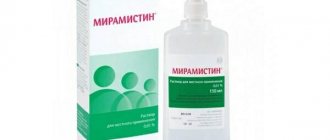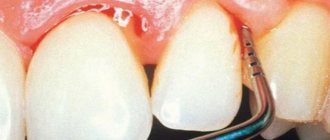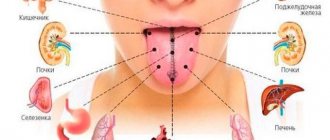The smell of ammonia from the mouth is a specific manifestation of gastroenterological pathologies, which has no restrictions regarding a person’s gender and age category. However, not only diseases of the gastrointestinal tract can cause such an unusual manifestation. The reasons may be dental problems and several completely harmless factors.
- Etiology
- Symptoms
- Diagnostics
- Treatment
- Prevention
Along with a specific odor, a large number of other clinical signs may appear, and they may differ in adults and children.
The cause of this symptom can only be determined through some laboratory and instrumental examinations of the patient. Treatment involves the use of only conservative techniques.
Causes
The smell of ammonia from the mouth appears in an adult as a result of:
- diseases ;
- diabetes mellitus;
- caries, gum inflammation, stomatitis;
- damage by infection or viruses (tonsillitis, pharyngitis, tonsillitis, frontal sinusitis, sinusitis, otitis media);
- cystitis;
- malignant, benign neoplasms in the digestive organs;
- increased load on the liver;
- diseases of the gastrointestinal tract, including dysbacteriosis.
The main task of the kidneys is to remove waste products from the body. Dystrophic processes, diseases of the tubules, stones in this organ do not allow it to work normally. As a result, ammonia is not completely eliminated through the urinary system. In case of kidney pathologies, in addition to the ammonia odor, swelling of soft tissues, increased or decreased blood pressure, and pain in the lumbar back are observed.
In diabetes mellitus, the genitourinary system and kidneys experience a greater burden of removing glucose from the body. The smell of ammonia is one of the symptoms of an impending hypoglycemic coma.
This is a dangerous condition in which a person needs immediate medical attention. In this case, the patient experiences heaviness throughout the body, decreased mental activity, the nasolabial fold turns blue, the palms become sweaty, and shortness of breath often appears.
How to quickly and permanently get rid of bad breath
New growths in the esophagus serve as a place for food particles that begin to rot and an ammonia smell appears.
In addition to diseases, the causes of ammonia odor are:
- unbalanced diet, fasting, abuse of diets, especially low-carbohydrate diets (large amounts of protein are unfavorable for kidney function);
- enough ;
- taking certain medications containing amino acids and nitrogen.
If the hygienic procedure - rinsing the mouth or brushing the teeth - cannot get rid of the unpleasant symptom, then qualified help is needed. First you need to see a therapist.
What is ozena?
This pathology affects the mucous membrane in the nose, and as it progresses, it affects the cartilage and bones. Medicine cannot yet name the exact reasons for the development of this disease, but people with underdeveloped frontal sinuses, excessively wide wings of the nose and an expanded facial part of the skull are predisposed to it.
The risk increases with poor nutrition, living in unsanitary conditions, and degeneration of the nasal mucosa, which disintegrates as a result of this process.
Ozena can be eliminated using conservative methods, for example, prescribing suppositories, tampons, and rinsing. Often patients require surgery to correct the shape of the nose. In this case, respiratory functions are completely preserved, but there is constant dryness. As a result, crusts appear that provoke an unpleasant odor. As the disease spreads, the larynx and middle ear are affected.
The smell of ammonia also occurs in the nose with diseases such as parosmia, allergies, sinusitis, and rhinitis. Parosmia is a condition characterized by impaired sense of smell due to various pathologies of the respiratory tract. At the same time, a person smells ammonia or another strong smell, but those around him do not feel it.
Symptoms
People characterize their condition differently. For some, the ammonia smell is accompanied by a sour taste, while others feel a rotten or heavy sweet aroma. Patients smell like rotten eggs or spoiled onions.
Diabetes mellitus causes the following symptoms:
- constant thirst and dry mouth;
- decreased visual acuity;
- increased fatigue.
In cases of illness and increased load on the liver, patients, in addition to the ammonia smell, have pain in the right hypochondrium, a yellow tint to the skin, poor general health, and nausea.
Dysbacteriosis is accompanied by heaviness in the abdomen, bloating, and stool disturbances.
Diseases of the oral cavity and teeth have their own characteristic and corresponding symptoms: pain and inflammation on the gums, plaque on the tongue, purulent formations.
In infectious and bacterial diseases, sore throat, rhinitis, cough, fever, and headaches are observed.
Can coronavirus cause an ammonia smell in the nose?
Unfortunately, even those people who have had COVID-19 in an asymptomatic form can experience this illness. The taste of ammonia may appear immediately after illness or several months after recovery.
People note the strange taste of already familiar products and the appearance of unpleasant odors from everything that surrounds them, and the hardest thing in this situation is that no one knows how to get rid of it.
For example, patients report feeling that everything around them smells like ammonia or tobacco smoke. Protein-rich foods acquire unbearable tastes and smells, so you even have to give them up.
Doctors say that the coronavirus attacks the immune system so much that it produces antibodies not only to the virus itself, but also to its own nerve cells. It turns out that the body begins to attack itself.
On a note!
The renowned Professor Lane and his team made an interesting observation. They found that the area responsible for smell had an excessively high concentration of ACE-2 (a zinc-containing metalloenzyme). Scientists believe that this substance serves as a conductor for the coronavirus; thanks to ACE-2, the virus penetrates the cells and infection occurs.
The professor believes that if their research is confirmed, then treatment of COVID-19 can be carried out using antiviral therapy through the nose.
Diagnostics
It is difficult for a person to recognize the smell of ammonia himself, and people around him are not always ready to tell the sufferer about it to his face.
The following activities are carried out at home:
- a clean cotton pad or napkin is placed under the tongue; they take it out after a couple of seconds and smell it; as a rule, you don’t need to sniff the smell of ammonia - it is felt immediately;
- lick the spoon, then proceed as in point 1;
- floss and toothpick will also transmit a strong odor.
How to prevent crown odor
If a person does not trust his own nose, then there are diagnostics at the dentist. In this case, special equipment is used.
Pharmacies sell modern small devices that detect the level of hydrogen sulfide in the body.
Chronic renal failure (CRF) and ammonia odor
The reasons for this phenomenon are often hidden in the development of such a serious pathology. CRF is characterized by the death of kidney tissue. Such pathological changes lead to disruption of the functioning of the entire body.
CRF is caused by urolithiasis, tumors of the urinary system, pyelonephritis, metabolic pathologies (diabetes, amyloidosis, gout), vascular disorders (atherosclerosis, hypertension), as well as hereditary diseases.
Under the influence of negative factors, the amount of functioning kidney tissue decreases. As a result, the level of urea and creatinine, nitrogenous products of protein breakdown, increases. Since the kidneys are not able to completely remove them, they are eliminated in other ways. In the overwhelming majority, the lungs and mucous membranes of the gastrointestinal tract, which are not designed for such loads, suffer from this.
Subsequently, uremia develops - self-poisoning of the body. A person begins to feel an aversion to meat, suffers from attacks of nausea, which can result in vomiting, is constantly thirsty, has muscle and joint pain, and cramps.
A clear sign of the disorder is a jaundiced tint of the skin and the smell of ammonia when breathing. At the same time, the amount of urine released is significantly reduced. Even with the use of diuretics, swelling occurs, electrolyte imbalance occurs, and blood pressure increases. Kidney failure leads to the development of anemia and gout, and increases the concentration of lipids in the blood.
The exchange of phosphorus, calcium and glucose and the function of the sex glands are also disrupted. As a result, a kidney transplant or regular hemodialysis is necessary.
If you experience an unpleasant sensation associated with an unusual odor, and there are disorders of the urinary system, it is necessary to take a biochemical test of blood and urine. Urography and ultrasound are used.
How to recognize the disease
According to medical statistics, ammonia odors in most cases (80%) appear as a result of diseases of the oral cavity - gingivitis, stomatitis, gumboil, fungus, etc.
Acute respiratory and viral infections - 10%. Diseases of internal organs - liver, kidneys, esophagus, genitourinary system - make up the remaining 10%.
Sometimes there is no smell during the day. For example, it is always present on an empty stomach, but disappears immediately after eating or taking other measures - brushing the tongue, gums, teeth, gargling, nose or mouth.
If the unpleasant smell of ammonia is continuous even after taking the above or other measures, then going to the doctor should not be put off for long.
Just like an adult, a child experiences rotten breath due to problems with the liver, esophagus, kidneys, poor diet, caries and inflammation of the gums.
Parents need to be especially vigilant if general weakness and nausea are added to the symptom. This may be a harbinger of latent diabetes mellitus. In this case, a blood sugar test will reveal pathology.
Cases when a person claims that there is a smell, but in fact there is none, are called halitosis in medical practice. A trip to the dentist and a measurement with a halimeter will dispel these beliefs. The device shows the level of hydrogen sulfide.
Prevention
Regardless of the age of the patient, every pathological tooth must be treated. The following preventive measures will help prevent the disease:
- Regular visits to the dentist.
- Timely treatment of internal systems and organs.
- Careful oral hygiene.
- Eat well, drink plenty of fluids.
- The presence of fruits and vegetables in the menu.
- Cleaning the tongue with a special brush.
- Using a humidifier.
The main component of success is a healthy lifestyle.
Treatment
Treatment begins with the exact cause of the odor. Diseases of the upper respiratory organs, kidneys, liver, and gastrointestinal tract should be treated under the supervision of a therapist or specialist. Dental problems can only be solved in a dental office.
The therapist will examine the patient and, if necessary, prescribe a number of diagnostic procedures (tests, ultrasound, tomography, x-rays, etc.). If specific diseases are suspected, he will refer you to specialists.
The smell of ammonia, which is not permanent, can be eliminated by following these measures:
- eating food and drinking enough water regularly;
- cleaning not only the teeth, but also the tongue, rinsing with a special composition;
- refusal of protein diets and adding carbohydrates to the diet.
To quickly get rid of unpleasant odors, coffee beans are used. It must be chewed and held in the mouth for a while.
What to do to treat and eliminate the symptom based on the reasons stated above?
Treatment is prescribed by the doctor based on the reasons that caused the symptom.
When diabetes , a specific diet is prescribed, blood glucose levels are monitored, and insulin is prescribed.
Keep in mind! In addition, the patient should engage in physical therapy and increase physical activity.
If kidney diseases , which are divided into infectious and non-infectious, the doctor prescribes antibiotics, hormonal and diuretic drugs .
Additionally, physiotherapy, herbal medicine and vitamins and minerals are prescribed.
In the treatment of thyrotoxicosis the following is used:
- Drug treatment , which consists of taking drugs that reduce the activity of the thyroid gland.
- Radioactive iodine , which, when accumulated in the body, destroys the functioning of the thyroid gland.
- Surgical intervention if the above methods do not help in treatment. The operation consists of removing the focus of thyrotoxicosis localized in the thyroid gland.
Treatment must be carried out with a mandatory diet , which is compiled individually for each patient.
Important! Be sure to control the amount of liquid you drink. This is necessary for proper kidney function.
You should drink at least 2 liters of water per day.
If the diagnosis does not reveal any abnormalities in the human body, then you can get rid of the unpleasant odor with the help of
antiseptic drugs : Chlorhexidine, Hexoral, Stopangin.
They help suppress the oxidative reaction of the metabolism of pathogenic bacteria.
You should rinse your mouth with the medications 2 times a day.
Folk remedies
You should know! Using folk remedies will help get rid of the ammonia taste in the mouth:
- St. John's wort tincture. She needs to rinse her mouth after any meal. To prepare, you will need 30 drops of alcohol tincture, which are diluted with 1 glass of water.
- Strawberry tincture. She needs to rinse her mouth after any meal. To prepare, you will need 1 tablespoon of dried strawberry leaves, which are brewed in 2 cups of boiling water.
- Olive oil. You need to take 1 teaspoon of olive oil and rinse your mouth with it.
- Coffee beans. To eliminate the unpleasant odor, just chew a few coffee beans.
- Tincture of oak bark. She needs to rinse her mouth after any meal. To prepare, you will need 1 teaspoon of bark, which is poured with 200 ml of boiling water.
- Beeswax. You need to melt the beeswax in a water bath, add honey, lemon juice, and a few drops of mint or tea tree essential oil. Cool the mixture and roll it into balls. This gum can be chewed several times a day.
Medicines
Necessary medications include:
- Hexoral (Hexitidine is the active substance) inhibits the proliferation of many bacteria and effectively destroys Pseudomonas aeruginosa, Proteus. Use with caution in children - taste disturbances may occur. For dental diseases, take twice a day for rinsing. This medication should not be swallowed.
- Miramistin - chlorhexidine - a bactericidal drug has a negative effect on gram - positive and negative bacteria. Used for the procedure - washing the bladder for inflammatory diseases. Do not use for skin diseases - dermatitis. Side effects are itching and other allergic reactions.
- Stopangin is a universal remedy that fights fungi, bacteria and infections. Rinse your mouth with the solution twice a day before eating.
Some patients felt a burning sensation in the mouth while using the medicine. Not recommended for use during pregnancy, atrophic pharyngitis and children under 6 years of age.
To ensure that these drugs do not cause harm, the approval of the attending physician is required before use.
During therapy, avoid eating cheeses, cottage cheese and other high-protein dairy products. These products leave a plaque in the mouth where pathogenic bacteria settle, which is the cause of the odor.
Why does my breath smell in the morning?
During treatment, you should not drink any alcohol-containing drinks. Ideally, you should also give up smoking.
Physiotherapy (KUV, electrophoresis of drugs, ultrasound) is prescribed by the therapist to patients in whom the smell of ammonia is associated with rhinitis, sore throat, otitis media, stomatitis.
How to get rid of it
Ideally, you need to see a doctor who will prescribe neuroprotectors and vitamin-mineral complexes. To speed up the regeneration of nerve endings, Glycine, which is easily found in every pharmacy, and B vitamins can be used.
The doctor must select the appropriate dosage, taking into account the patient’s complaints.
The ammonia aroma disappears when the infection is completely cleared from the body. This means that the normalization of the sense of smell is a sure sign of final recovery.
If ammonia vapors interfere with eating food that seems foul-smelling, you can switch to fresh foods - potatoes, rice. As a last resort, try protein shakes, which are prepared for athletes from special mixtures, but without flavoring additives or flavorings.
Doctors advise temporarily avoiding foods with strong flavors – in particular:
- fried meat and poultry;
- concentrated sauces and marinades;
- fresh garlic and onions;
- chocolate;
- products containing mint and menthol (including chewing gum).
It is also advisable to refrain from visiting stores selling perfumes and household chemicals, construction sites and shopping centers. It is better not to visit baths and saunas because the air is too dry, irritating the nasal mucosa and prolonging its recovery period.
Sweat smells like ammonia after exercise: causes of the unpleasant phenomenon
If the discharge in the form of sweat has acquired a pungent ammonia smell, then enhanced hygiene alone is unlikely to be enough. Indeed, very often this condition indicates a malfunction of internal systems or organs. To identify the exact cause of this pathology, you should consult a specialist.
Let's look at the main reasons why sweat smells like ammonia, right now.











